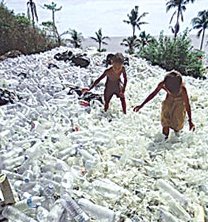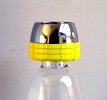But not everywhere.
News that Jakarta consumers of piped water face a price hike of 8.39% has lead me to tap into the flow of information about this most precious resource.
Currently, 700,000, or 12 percent, of the city's 8.4 million population subscribe to water processed and supplied by PT Thames Pam Jaya (TPJ) (UK) and PT Pam Lyonaisse Jaya (Palyja) (France).
This figure, given in yesterday's Jakarta Post, shows a dramatic reduction from the 34% I quoted last November. Perhaps it's because of the reputedly lousy service provided by the foreign monopolists who seem keener to boost their share values than provide a public service, as contracted to do so by City Hall.
The administration delayed the planned announcement because the city council said the proposed percentage (17.32%) was unrealistic compared to the service provided by water companies to subscribers.
The council set up a team to assess the service and asked the administration to delay the decision on the new rate. The team recommended the administration effect tight control of the quality of water, its distribution and services.
Quite.
Luckily for some of the population, our wealth is sufficient to budget for a regular supply of bottled water.
Except ....
1. The largest supplier of bottled water in Indonesia is subject to the whims of Danone, the originally French, now multinational, conglomerate. Three years ago Aqua accounted for 12% of Danone's bottled water sales worldwide.
Danone is but one of many conglomerates reaping windfall profits from Indonesia, one of the most populous nations on Earth.
The drop in the value of the rupiah means it's cheaper to buy Indonesian companies. The government has made investing easier by removing barriers such as a 49% limit on foreign shareholding in Indonesian companies and a ban on foreign investment in the distribution business. And using Indonesia as an export base makes more and more sense as new trade agreements with the country's Southeast Asian neighbors have lowered tariffs on most products to 5% or less.
As a result, most of Indonesia's leading household brands are in foreign hands these days. Unilever has the leading soy sauce, Bangso, and the best-selling tea, Sariwangi. The second-biggest maker of cookies and crackers, Helios Arnott's Indonesia, is owned by Campbell Soup Co. Danone owns the top-selling bottled water, Aqua.
SOURCE: BUSINESS WEEK 24th March 2003
So, where do the profits go? Do they increase Indonesia's wealth or that of the privileged few shareholders?
2. According to the bumph on the Aqua website, water is good for you.
Did you know that water fulfills the body's need for liquid?
Wow. Really?
Except .... bottled water isn't that good for you.
In 1997, the United Nations Food and Agriculture Organization concluded that bottled water does not have greater nutritional value than tap water.
Idaho?s Pure Health Solutions, a water purification company, conducted its own study that concluded certain bacteria grow significantly in bottled water over a 12-day period. Bacteria will normally grow in tap water within a few days if it is kept bottled up at room temperature. Most municipal water managers leave a residual amount of chlorine in tap water after treatment specifically to inhibit the growth of bacteria as the water runs through pipes and sits in tanks.
Do read the full article for more authoritative reasons for debunking the bottled water industry.
3. The growth of the bottled water industry, in pursuit of extra sales of course, is down to hype and packaging, as I argued a week or so ago.
And if you didn't agree with me then, have a look now at H20m, a crystal clear natural spring water brand infused with the power of intention through words, music and thought.
The theory is that given we are 75% water ~ I thought we were 90%, but who's quibbling? ~ and if we respond to the vibrational frequencies of Love and Perfect Health, then so can water and those positive energies can be transmitted by imbibing water treated with kind words ....
There are two 'Fantastic Infusions' ~ Love and Health, with Willpower, Prosperity and Gratitude in the pipeline, so to speak.
(Thanks to Strange New Products.)
What I look forward to are the Infusions of Lust and Instant Gratification.
4. And what do we do with packaging, those ubiquitous plastic bottles, once we've drunk our fill?
 Plastic water bottles can take 1,000 years to biodegrade. Nine out of 10 water bottles end up as garbage or litter, and that means 50 million per day.
Plastic water bottles can take 1,000 years to biodegrade. Nine out of 10 water bottles end up as garbage or litter, and that means 50 million per day. Only a small percentage are recycled.
Only a small percentage are recycled.5. Jakartass can foresee a time when we will guard our bottles of water as closely as we do our credit cards and mistresses. If I had the distribution rights here, I would recommend Kwik Top, a small, re-usable, patented, in-expensive and user friendly bottle locking device with the unique feature of an integrated combination-lock which fits standard plastic water and carbonated drink bottles worldwide including Coca Cola & Pepsi.
 And Aqua?
And Aqua?




